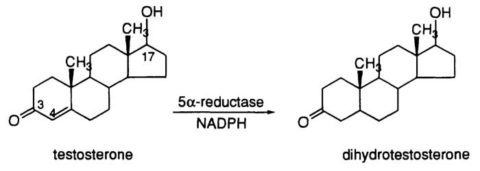
DHT is commonly associated with pubertal changes and baldness in men. However, DHT has various health benefits and is possibly effective at improving certain diseases. Read on to learn the benefits, risks, and how to increase/decrease it.
What is DHT?
Dihydrotestosterone (DHT) is a sex hormone created from testosterone in the body. It plays a major role in the development of masculine characteristics (body hair, muscle growth, and a deep voice).
DHT is critical to the development of the penis and prostate in men. It’s a much more powerful hormone than testosterone and plays a major role in male-pattern baldness [1].
Men with an enzyme (5-AR) deficiency are unable to make DHT from testosterone and have reduced development and function of reproductive organs [2].
DHT activates androgen receptors needed for sexual differentiation during fetal development and changes in males during puberty. It is also necessary for maintaining a sex drive in men [3].
9 Potential Effects of DHT
1) Blood Sugar Control
DHT may help those with diabetes and high blood sugar by regulating glucose metabolism [4].
According to a study on mice, it may lower blood sugar levels and help with type 2 diabetes in males. Application of DHEA to rats increased levels of DHT and improved insulin-sensitivity, weight, and body fat [5, 6].
2) Memory
Men between the ages of 34 and 70 showed improvements in memory when treated with DHT skin patches [7].
3) Sexual Function
DHT can improve sexual ability in men regardless of factors like age and obesity. Along with testosterone, it’s necessary to maintain a healthy sex drive in men [8, 9].
DHT helped boys born with reduced penile function. It is the main hormone to prevent erectile dysfunction in rats [10, 11].
Women with lifelong sexual abstinence were more likely to have low levels of free DHT in the blood [12].
4) Heart Health
Higher levels of DHT were associated with lower amounts of fat deposits in the hearts of men with coronary artery disease (CAD) [13].
Lower levels of DHT and testosterone resulted in an increased risk for cardiovascular complications for men undergoing testosterone-lowering treatment for prostate cancer. Elderly men with higher levels of DHT have lower death rates from heart disease [14, 15].
5) Strength and Muscle Mass
In women, muscle DHT levels correlate with strength and power [16].
DHT appeared to increase muscle mass in postmenopausal rats [17].
6) Autoimmune Diseases
Men are 3-20 times less likely to get multiple sclerosis, lupus, rheumatoid arthritis, Hashimoto’s, Graves’, Sjogren’s, and other autoimmune diseases. This may be due, in part, to male hormones having a protective effect against autoimmune conditions [18, 19, 20, 21, 22, 23].
In animal models, DHT was useful in treating autoimmune conditions such as multiple sclerosis (MS), prostatitis, Graves‘ and uveitis by balancing the immune system. Specifically, it can lower T helper cells (Th1) that are higher in autoimmune diseases [24, 25, 26, 18, 27, 28].
Here are some effects of sex hormones on the immune system [29]:
| Estrogens | Androgens |
|---|---|
| Overall: enhanced immune response | Overall: diminished immune response |
| Enhanced antibody-mediated responses to exogenous antigens | Decreased antibody production |
| Enhanced T-cell cytotoxicity | Decreased T-cell proliferation |
| Increased cytokine and chemokine levels (interferon-gamma production) | Alteration of the cytokine profile to decrease inflammation (including decreased interferon-gamma production) |
| Decreased IL-6 production | Increased IL-6 and IL-10 production |
| Enhanced antigen-presenting cell activation | Decreased MHC class II antigen expression on antigen-presenting cells |
| Stronger innate immune responses by increased nitric oxide production | Reduced nitric oxide production |
7) Healthy Cognitive Function
Declining levels of DHT and other sex hormones in older men are associated with declining cognitive function [30].
8) Anxiety & Depression
Testosterone’s anti-anxiety benefits were shown to be a result of the actions of DHT in the brain [31].
The drug finasteride, which lowers DHT levels in the blood, may induce symptoms of depression [32].
9) Bone Growth
DHT is vital for bone density – increased blood levels are associated with higher bone density in men [33].
Other
DHT relieved pain caused by diabetes in rats [34].
Negative Effects of High DHT
1) Male Pattern Baldness
A study found that a group of men with male pattern baldness had higher levels of DHT [35].
Higher levels of DHT were found in blood samples obtained from men with premature baldness [36].
2) Acne
DHT may trigger inflammatory acne [37].
3) Prostate Cancer
DHT is critical for the normal development of the prostate, but it can also contribute to benign prostate enlargement [38].
DHT can fuel prostate cancer even if testosterone production is stopped by removing the testicles [39, 40].
On the other hand, men with lower levels of DHT are more likely to get prostate cancer, have an advanced form of prostate cancer, and have a decreased survival rate for prostate cancer [41].
4) Depression In Women
In one study, women treated for major depression had higher levels of DHT and other male sex hormones [42].
5) Male-Like Hair Growth In Women
Finasteride, which inhibits DHT production, is effective in treating women suffering from male-like hair growth [43].
Ways To Increase DHT
Discuss any significant lifestyle, diet, or supplement changes with your doctor before incorporating them into your daily regimen. Many such changes can have unexpected interactions.
Lifestyle
Foods and Nutrients
Supplements
Ways To Decrease DHT
Note: most of the studies cited here are done in animal or cellular models. As with strategies to increase DHT, remember to discuss any significant changes to your lifestyle, diet, and supplement plans with your doctor to prevent unexpected interactions.
Drugs
- 5AR Inhibitors (Finasteride, Dutasteride): they prevent testosterone from converting into DHT [55]
- Testosterone (in elderly men) [56]
Supplements
- Red Ginseng (cell studies) [57, 58]
- Curcumin [59, 60]
- Saw Palmetto (humans) [61]
Foods and Nutrients
- Black Tea [62]
- Flaxseeds (humans) [63]
- Fenugreek (humans) [64]
- Soy + Green Tea [62]
- Reishi (humans) [65, 66]
- Copper (humans) [67]
- Nettle Root [68]
- PUFAs, especially GLA [60]
- Vitamin B2 [69]
- Pumpkin Seed Oil (humans) [70]
- Amla [71]
These are products that only inhibit the effects of DHT.
- Chyawanprash – Contains certain tannins and omega-6 fatty acids, which are anti-inflammatory and protect hair [72]
- Berberine (with meals) [73]
- Fo-Ti [74]
- Black pepper – contains piperine, which has been shown to inhibit androgens like testosterone and dihydrotestosterone [75]
- Andrographis [76]
Takeaway
DHT is a powerful sex hormone created from testosterone. It helps develop reproductive organs and masculine characteristics in men. It also boosts libido and sexual health. Besides that, some researchers believe that DHT may support blood sugar control, mental health and cognition, bone and muscle strength, and immunity.
You can increase it by exercising, losing excess fat, and consuming healthier dietary fats and zinc.
Too much DHT may contribute to male pattern baldness, depression and hair growth in women, and prostate enlargement. According to some studies, some natural strategies may be able to lower DHT, including tea, soybean, nettle root, and pumpkin seed oil. Red ginseng, curcumin, and saw palmetto may also help.


